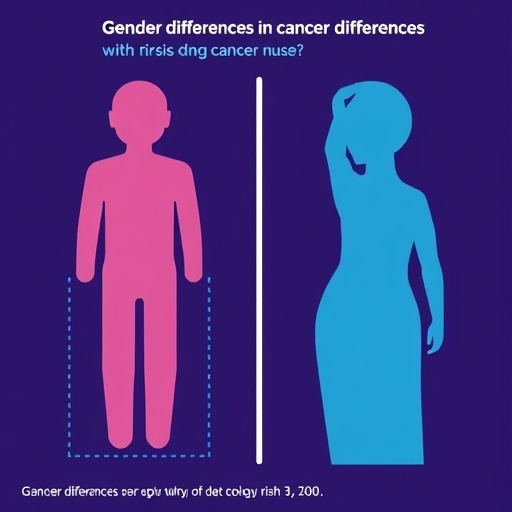Recent research highlights the complex relationship between behavioral factors and cancer, revealing intriguing sex and gender differences. A groundbreaking umbrella review, spearheaded by Marozoff et al., consolidates findings from various systematic reviews, providing a quantitative synthesis of the available data. The study, published in the journal Biological Sex Differences, offers valuable insights into how risk behaviors and preventive measures related to cancer may not affect all individuals equally. This newfound knowledge has the potential to inform personalized health strategies and enhance public health initiatives targeting cancer prevention.
At the core of this review lies the exploration of how lifestyle choices, such as diet, physical activity, and smoking, intersect with gender and influence cancer susceptibility. Notably, certain behavioral patterns present differing levels of risk for males and females, suggesting that tailored approaches towards cancer prevention could yield more effective results. The nuanced understanding of these differences is not only a step forward in oncology but also a vital contribution to gender-oriented health policies.
Marozoff and colleagues meticulously sifted through numerous systematic reviews to uncover overarching trends in the data. By focusing on established behavioral factors, they reveal critical sex-specific patterns that shed light on unexpected associations with various cancer types. The researchers emphasize the importance of recognizing that hormones and genetic factors, combined with lifestyle choices, can have disparate impacts across genders — a notion often overlooked in existing cancer research.
Interestingly, tobacco use emerges as a primary area of concern in this review. The data suggest that while smoking is a well-documented risk factor for several cancer types, the extent and implications of its impact can vary significantly between genders. The review underscores the necessity for gender-sensitive smoking cessation programs that acknowledge these differences, ultimately aiming to enhance outcomes for both men and women.
Alongside tobacco, dietary habits also represent a critical behavioral factor. The authors report findings indicating that the intake of certain foods and dietary patterns can have differential effects on cancer risk depending on one’s sex. The review highlights the need for nuanced dietary guidelines that cater to the specific nutritional requirements and risks associated with different genders, guiding individuals towards better health outcomes.
Physical activity stands out as another domain in which sex and gender differences are apparent. The comprehensive review suggests that while regular exercise is universally beneficial in reducing cancer risk, the level of protection it provides might not be the same across all populations. Factors such as social norms, access to exercise facilities, and motivation can vary by gender, emphasizing the need for inclusive fitness initiatives designed to engage and support all individuals.
Mental health and behavior also play a significant role in cancer development. The review delves into how psychological factors, like stress and depression, interact with physical health behaviors and subsequently influence cancer risk. The researchers note that stress responses may differ between genders, which in turn can lead to varying health outcomes. By recognizing these disparities, healthcare providers can better address mental well-being as part of a comprehensive cancer prevention strategy.
Moreover, the implications of socioeconomic factors on behavior and cancer risk are significant. Marozoff et al. point out that economic stability and access to healthcare resources can shape health behaviors, with distinct effects based on gender. In societies where gender inequalities persist, women may face challenges in accessing preventive health measures, which can contribute to a higher cancer burden. Addressing these disparities is essential for achieving equitable health outcomes.
The team’s findings advocate for a greater emphasis on gender-responsive health research. As cancer biology and epidemiology continue to evolve, it is crucial that future studies incorporate a sex and gender framework in their methodologies. This could lead to more precise insights and interventions tailored to the diverse needs of the population. In turn, a focus on gender in research can empower individuals to take charge of their health and make informed lifestyle choices.
The comprehensive nature of this review opens up new avenues for future investigations into the role of gender in cancer epidemiology. Researchers are encouraged to explore underrepresented areas, including the impact of emerging lifestyle factors, technology use, and cultural influences on health behaviors. Such inquiries could further enrich the dialogue surrounding cancer prevention strategies tailored to specific population needs.
Overall, Marozoff et al. provide a timely and essential contribution to the ongoing conversation about personalized medicine and health equity. By illuminating the complexities of behavioral factors in relation to sex and gender, this review not only enhances our understanding of cancer risk but sets the stage for future advancements in public health recommendations.
As our society continues to grapple with issues of equity and access in healthcare, the insights from this review are particularly relevant. They remind us that prevention strategies must evolve alongside our understanding of the multifaceted nature of cancer risk. Embracing a gendered perspective in health research could ultimately pave the way for innovative approaches to cancer prevention, leading us toward improved health outcomes for all.
In conclusion, the umbrella review represents a scientific milestone in our understanding of sex and gender differences related to cancer risk factors. Its findings have significant implications for healthcare providers, researchers, and policymakers alike. Moving forward, the call for gender-responsive health strategies becomes increasingly clear, highlighting that to truly combat cancer, we must consider the intricate interplay between behavior, biology, and gender.
Subject of Research: The association between behavioral factors and cancers with an emphasis on sex/gender differences.
Article Title: Sex/gender differences in the association between behavioural factors and cancers: an umbrella review of systematic reviews with quantitative synthesis.
Article References:
Marozoff, S., Li, Y., Mithani, N. et al. Sex/gender differences in the association between behavioural factors and cancers: an umbrella review of systematic reviews with quantitative synthesis.
Biol Sex Differ (2025). https://doi.org/10.1186/s13293-025-00793-6
Image Credits: AI Generated
DOI:
Keywords: Cancer, Behavioral Factors, Gender Differences, Public Health, Epidemiology, Prevention Strategies.




